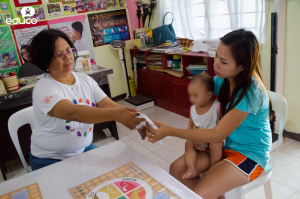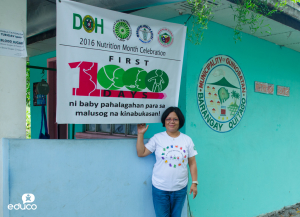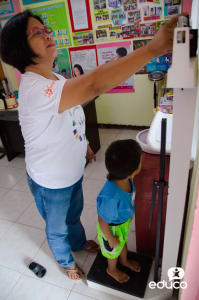Commitment, determination, time management and love.
If you ask Wedona Ariola, a multi-awarded Barangay Nutrition Scholar (BNS) of Quitago in Guinobatan, Albay, these are the vital ingredients that make volunteering for her community worth it.
“But the greatest is love,” she stresses, “for how can I share my knowledge to the community members when I do not know how to love.”
Wedona, widowed after having three children, is the Federation President for BNSs in the municipality. She became a BNS in 2008 and attends to the needs of the 485 households in their village.
It used to be that the prevalence for malnutrition for children between 0 to 59 months was 27%, and that was in 2009 when Wedona was still a newbie BNS. Fast forward to 2016, that number has gone down tremendously to only 3.3%.
“At the start, the challenge was really how to convince the parents to improve nutrition-related practices at home and change their health-seeking behaviors,” she relates when asked about how she managed to facilitate reduction of malnourished children in Quitago.
“The training provided by Educo (then Intervida) on nutrition program management (NPM) has helped us determine the real causes of malnutrition in our village which also facilitated identification of appropriate interventions to solve our issues,” she also explains.
Educo’s strengthening of local nutrition structures has facilitated reactivation and capacitation of local nutrition councils. At the municipal level, municipal nutrition councils were strengthened. For Guinobatan, an ordinance was also enacted in support to nutrition.
A key part of this project is awareness-raising, which resulted in the appreciation of the local councils and establishment of a nutrition office or corner at the village level. In Quitago, its nutrition office also houses a breastfeeding corner.
“In the past, we have been doing different programs to improve our nutrition status but we realized that unless the parents are continuously educated, supplemental feeding is not at all effective,” she explains.
During the training on the World Health Organization-Child Growth Standards (WHO-CGS), the BNSs were also trained on counselling.
 Wedona recalls, “One-on-one counselling helps a lot in educating parents. Pregnant women have to be educated on the importance of a well-nourished mother. They also need to learn about the importance of exclusive breastfeeding, child-growth monitoring and in preparing nutritious food for the eventual introduction of complementary food.”
Wedona recalls, “One-on-one counselling helps a lot in educating parents. Pregnant women have to be educated on the importance of a well-nourished mother. They also need to learn about the importance of exclusive breastfeeding, child-growth monitoring and in preparing nutritious food for the eventual introduction of complementary food.”
“Mothers of underweight children are also given counselling sessions. I also do my research since people starts to trust you, it is not easy just lax and loose the momentum,” she adds.
Her story working for the community members is as eventful as her personal story. A nurse by profession, she previously worked with DepEd and as a company nurse in Makati City in the country’s capital region. But she eventually came back home when she realized that her young children needed their mother.
She tried working with the local government but the pay could not provide enough for her and her three children because she was just a contractual worker. To make ends meet, she tapped into her culinary instincts and became an entrepreneur, cooking meals and selling them around the village and the market.
 When she got offered with the BNS post, it worked well for her since it was not an 8-5-work load and allowed her to continue her business. It also gave her the opportunity to continue learning and helping her community.
When she got offered with the BNS post, it worked well for her since it was not an 8-5-work load and allowed her to continue her business. It also gave her the opportunity to continue learning and helping her community.
“I hope that the other BNSs will continue to be inspired and continue to love their work even if financial concern is at hand,” she muses when asked about the challenges of a BNS.
Now that all her children have graduated from college, she has already stopped vending food since her children have started working for the family.
“I also hope that the local councils will also recognize our contribution to the community and for them to be more supportive to what we do (for nutrition) since we do all the legwork from data gathering to report preparation,” she says.
Wedona is indeed a prolific BNS. In 2015, she was one of awardees for the Most Active BNSs given by Educo (then Intervida) wherein she received a prize package that include office furniture (tables and chairs), documentation equipment and electric fan for the nutrition office.
In 2014, Quitago won Php 300,000 in the Search for Best in Nutrition – Barangay Category sponsored by the Province of Albay. The prize money was used for the extension of the Barangay Nutrition Office, purchase of a laptop, steel cabinet, LCD projector, conduct of nutrition-education sessions and prizes for the corn gardening contest. The extension area allowed for a more convenient waiting area for pregnant women, lactating mothers and mothers with young children. The projector and the laptop allowed for better presentation materials and maintaining nutrition data. Quitago was also a special awardee in the 2015 for Best Nutrition.
 This year, Wedona also won the Regional Nutrition and Health Quiz. She is also a nominee for the National Best BNS after winning at the provincial and regional levels. Awarding at the national level will be during the last quarter of 2016.
This year, Wedona also won the Regional Nutrition and Health Quiz. She is also a nominee for the National Best BNS after winning at the provincial and regional levels. Awarding at the national level will be during the last quarter of 2016.
Happily she shares, “These wouldn’t have happened without Educo. The learnings I got from the WHO-CGS training, the NPM and the continuous support during ‘Operation Timbang’ or weighing of children 0-71 months has been very helpful.”
“I still remember the days when I wanted to hide whenever Educo visited our barangay because it meant another round of heavy workload!” she laughingly recalls.
The stories of Wedona and Quitago are part of the results of the partnership between Educo and the local government of Guinobatan. Without the receptive attitude of the local chief executive and those who supported the nutrition program, no local nutrition councils would have been strengthened, no ordinance would have been enacted and a good number of children would still be malnourished.
# Story by Mariella, MEL Specialist





